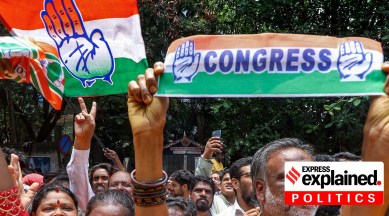Congress wins in Karnataka: Which are the states where the Congress is in power?
With a resounding victory in Karnataka, Congress is now in power in 7 states – in 4, it is in power by itself, in 3, it is a part of a larger coalition.

Congress has scored a resounding victory in the Karnataka Assembly Elections, crossing well beyond the halfway mark of 113.
With a win in Karnataka, Congress will now be in power in seven state assemblies. In four of these – Himachal Pradesh, Rajasthan, Chhattisgarh and now Karnataka – it is in power by itself. In three others – Bihar, Jharkhand and Tamil Nadu – it is a part of the ruling alliance.
Himachal Pradesh
The last state in which Congress won an assembly election (in 2022), the current term of the Himachal Pradesh Assembly is till 2027. In a 68-seat house, Congress holds 45 seats with Chief Minister Sukhvinder Singh Sukhu winning from Nadaun in western Himachal.
Congress’s main opposition in the state is the BJP which won only 25 seats on the back of an anti-incumbency wave and some major policy promises by the Congress, including the rollback of the controversial New Pension Scheme in the state.
While a leadership tussle was anticipated in the state, with Congress having multiple powerful leaders in the state, the party managed to avoid any trouble and appointed Sukhu, a career Congress politician and former student union leader.
Rajasthan
Rajasthan is one of the next few states going to the polls later this year. In 2018, Congress won 100 out of 200 seats in the Assembly elections, just one short of the majority mark.
While the party was able to form the government under the leadership of veteran Ashok Gehlot, the elections were marked by a wave of anti-incumbency sentiment against Chief Minister Vasundhara Raje of the BJP, which did not translate into the resounding Congress win that was expected.
Since 2018, Congress’s rule of Rajasthan has been marred with infighting within the party, with its two tallest leaders, Sachin Pilot and Chief Minister Ashok Gehlot, sharing a frosty relationship.
The polls later this year will prove to be a major challenge for the party which will desperately try to retain control of the country’s largest state by land area.
Chhattisgarh
Like Rajasthan, Chhattisgarh too goes to polls later this year. In 2018, Congress trounced the BJP in Chhattisgarh, winning 68 seats to the BJP’s 15 in a 90-seat state assembly. It formed the government in the state after being in opposition for fifteen years – since 2003. Then incumbent chief minister, Raman Singh, had been in power for 15 years.
Congress again had a decision to make about the chief minister – on one hand was the party’s OBC face and popular leader Bhupesh Baghel and on the other was the titular Maharaja of Surguja and party veteran TS Singh Deo. Congress chose Baghel and at the time, “promised” that Deo would get chief ministership in the second half of the term. Baghel, however, has remained CM.
Karnataka
Congress has won a resounding victory in the southern state, winning approximately double the number of seats as BJP. Now Congress will have to decide who will be the chief minister. On one side is former Chief Minister and current Leader of Opposition Siddaramaiah. On the other hand, is firebrand politician DK Shivakumar.
States in which Congress is in coalition
In the 2020 Bihar Assembly Elections, an alliance led by the BJP (74 seats) and JD(U) (43 seats) wrested power in the 243-seat Bihar Assembly. Congress, which won only 19 seats, was a part of the opposition alongside RJD, CPI (ML)L and CPI (M). However, Chief Minister Nitish Kumar of JD(U) withdrew from his alliance with the BJP and joined the then-opposing parties in 2022, to form a government with a 2/3rd majority. Currently, Congress is a part of this ruling alliance and has two ministries with it.
The 2019 Jharkhand Assembly elections happened just a few months after the national elections, with BJP expected to carry its national momentum into it. However, an alliance of JMM (30 seats), Congress (16 seats) and RJD (1 seat) formed the government, in the 81-seat house. Currently, the chief minister of Jharkhand is JMM supremo Hemant Soren, with Congress holding 4 ministerial portfolios in his government.
The 2021 Tamil Nadu Assembly elections were the first since the deaths of the state’s two tallest leaders – M Karunanidhi (of DMK) and J Jayalalithaa (of AIADMK). The DMK-led Secular Progressive Alliance decisively won the elections with DMK securing 133 seats by itself. Congress, a part of this alliance, won 18 seats and thus is a part of the current MK Stalin-helmed government.
Upcoming state elections in 2023
There are five more state assembly elections scheduled for this year – in Chhattisgarh, Madhya Pradesh, Mizoram, Rajasthan and Telangana. Congress is in power in two of these states and will face a tough challenge fighting off anti-incumbency and party infighting to retain these. It will also like to win back Madhya Pradesh, where it had formed the government by a narrow majority in 2018 but failed to keep that majority amidst a spate of major defections, including that of current Union Civil Aviation Minister Jyotiraditya Scindia.